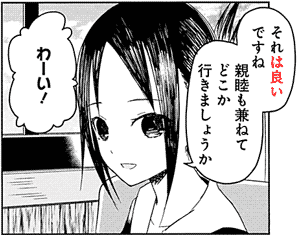Manga: Hataraku Saibou~ はたらく細胞 (Chapter 1)
Grammar
The phrase -wa ii ~はいい is the combination of the wa は particle plus the i-adjective ii いい, which means "good."Given this, normally, it would be reasonable to expect a phrase containing wa ii to mean "something is good." And since this wa は particle probably has a contrastive function, it's "something is good (unlike some other stuff which is not good.)"
For example:
- neko wa ii
猫はいい
Cats are good. (unlike dogs, I hate dogs.)
However, sometimes such phrase has a completely different meaning instead:
- neko wa ii
猫はいい
I don't need cats.
Which might make you wonder: "what is wrong with Japanese people?" I mean, ii いい is supposed to be "good," right? If something is "good," then you want it, right? If you say you don't need something, it's because you don't want it, right??? SO WHY DOES THE SAME PHRASE MEAN ABSOLUTELY OPPOSITE THINGS?!??!!?
それはいい
In order to understand this opposite mess we have to think oppositely too. What's the opposite of good? It's "bad.". If something is bad, then, well, then it's bad, we need to fix it, we need to make it good.But if something is already good, then it's already good: we don't have to do anything about it. We can't make it good twice. It's already in a satisfactory state. Change is unnecessary.
Thus, the way -wa ii ~はいい works in Japanese feels like:
- sore wa ii
それはいい
About that: it's good.- That is good.
- That is okay. That is alright.
- That is fine, I don't need help with that.
- I don't need that.
- That is unneeded.
Note that the literal way of saying "that is unnecessary" would be:
- sore wa iranai
それは要らない
About that: [I] don't need it.
The difference is that sore wa ii tends to be used when you dismiss something someone already gave or is already giving you, because there are other, more important matters to attend, while sore wa iranai tends to be used when you really don't want something at all because you don't like it or it isn't useful to you.
Examples
For reference, some examples of -wa ii ~はいい in action.礼はいい
Manga: Hataraku Saibou~ はたらく細胞 (Chapter 1)
- Context: the Red Blood Cell thanked the White Blood Cell for his hard work. The White Blood Cell responds:
- rei wa ii
礼はいい
"Expressing gratitude is good." (literally.)- Which means:
- Thanking is unnecessary.
- rei wa iranai 礼は要らない
[I] don't need [your] thanks.
- shigoto wo shita dake da
仕事をしただけだ
[I] only did [my] job.- He's saying he doesn't need to be thanked for just doing what he was supposed to do anyway.
挨拶はいい
Manga: Fullmetal Alchemist, Hagane no Renkinjutsushi 鋼の錬金術師 (Chapter 3)
- ...kore wa
・・・これは
"...this [is]"- Expression used when examining something.
- chuui-dono, konna musa kurushii tokoro e youkoso
中尉度 こんなムサ苦しい所へようこそ
First lieutenant, to a filthy place like this, welcome.- This is sarcasm. He doesn't like the lieutenant and is wondering what he's doing in a "filthy place" such as his establishment.
- aisatsu wa ii
あいさつはいい
"Greetings are good."- I haven't come all the way here to hear you say "welcome."
- Let's get down to business.
お前はいい
Manga: Danna ga Nani wo Itteiru ka Wakaranai Ken 旦那が何を言っているかわからない件 (Chapter 7)
- Context: devoid of younger siblings, a woman asks her husband's otouto 弟 a favor.
- oneechan tte yonde moratte-mo ii ka na?
お姉ちゃんって呼んでもらってもいいかな?
Can [I] have [you] call [me] "oneechan"?- oneechan お姉ちゃん
Older sister.
Also: a young women older than you.
- oneechan お姉ちゃん
- nante...
なんて・・・- When used after a phrase like it's being used here, it means you shouldn't take that phrase seriously: treat it like I was joking.
- In anime, it often appears after statements that are too serious (out of character) or too embarrassing (forget everything I said), like confessions of love.
- o... oneechan
お・・・お姉ちゃん - uwa... nanka kandou...!!
うわ・・・なんか感動・・・!!
Whoa... [I] feel sort of moved...!!- kandou suru 感動する
To feel moved emotionally. (literally written with "to feel," kanjiru 感じる and "to move," ugoku 動く.)
- kandou suru 感動する
- oneechan❤
お姉ちゃん❤- This time it's her husband saying it.
- omae wa ii
お前はいい
"You are good."- You don't need to say it.
- I didn't ask you to do it, I asked your brother.
- You I don't care about.
"That's a Good Idea"
Not every time -wa ii ~はいい shows up it's going to be the "I don't need it" meaning. Of course, sometimes it's the just-as-one-would-expect "good" meaning. For reference:
Manga: Kaguya-sama wa Kokurasetai ~Tensai-Tachi no Ren'ai Zunousen~ かぐや様は告らせたい~天才たちの恋愛頭脳戦~ (Chapter 7)
- Context: secretary Chika comes up with an idea: in the summer, everybody in the student council should go on a trip. The vice-president Kaguya comments:
- sore wa ii desu ne
それは良いですね
That's good, [I think].- That's a good idea!
- shinboku mo kanete
親睦も兼ねて- This phrase is used when planning social events.
- It means the event should also deepen your "familiarity," shinboku 親睦, with everyone else that is going.
- In this case, the summer trip should be something that helps the student council become better friends, besides being a fun trip by itself.
- kaneru 兼ねる
To do two things at once. (shinboku, and...)
- doko-ka ikimashou ka
どこか行きましょうか
Let's go somewhere. - waai!
わーい!
Yay!
See Also
- mou ii もういい
"Already fine." Often used in a way similar to wa ii.




No comments: